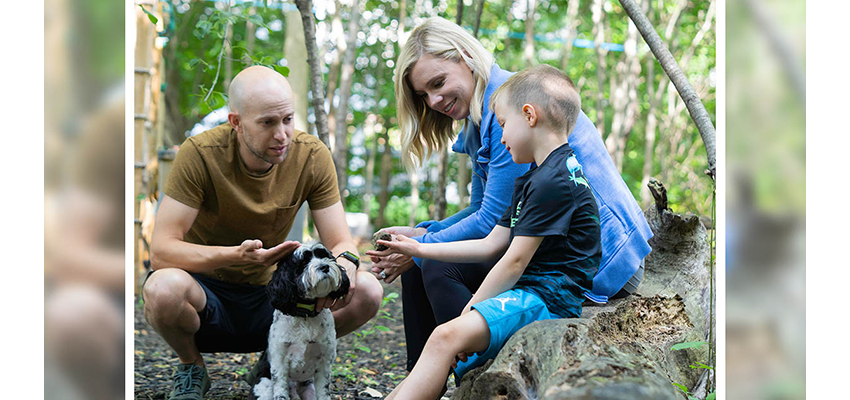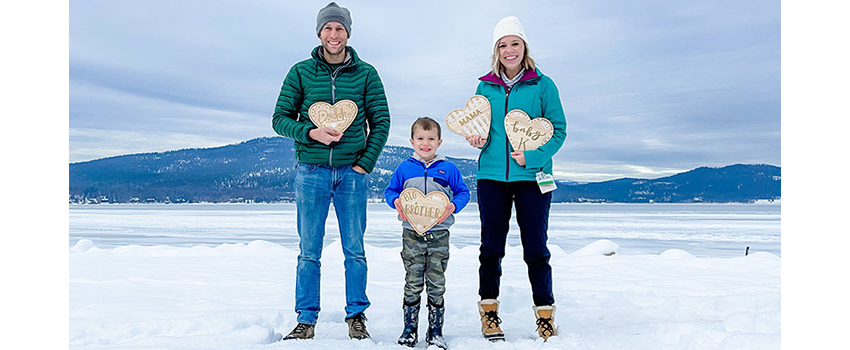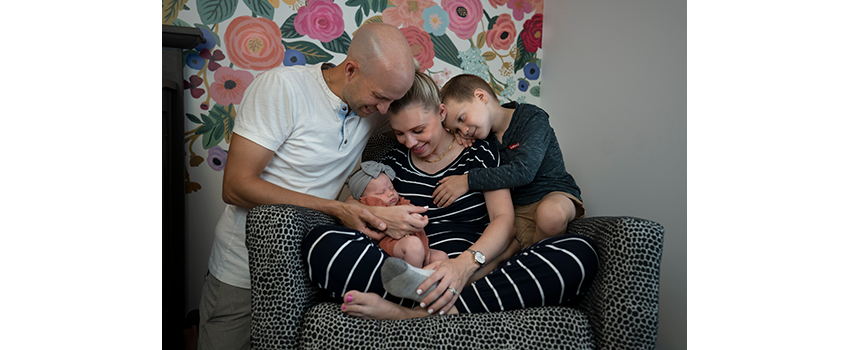Melanoma and motherhood
contributed by Cecilia Warchol and Mary Clare Fischer
Finding out that she had stage 3 melanoma was enough of a shock for Leah Koskinen. Hearing that she might need to delay pregnancy as a result was even more stressful.

Leah Koskinen never imagined she would be a stay-at-home mom in her mid 20s. She used to think, if anything, her husband would stay home while she became the breadwinner.
But after being home with her newborn son for two months, she couldn’t imagine not being around to raise him.
The phrase, “Because you’re a mom now…” was all Leah needed to hear from her own mother to be convinced that she should start seeing a dermatologist. Her fair skin and number of moles gave her extra reasons to make an appointment for a check-up.
One of the spots Leah was hoping the doctor could examine was a mole that had recently popped up on her left shoulder, noticeable because it was right where her bra strap lay.
The dermatologist didn’t think the spot was an issue, but just to be safe, she removed it and sent the cells off for analysis.
A week and a half later, the dermatologist called. Leah had melanoma, a type of skin cancer — and because of the depth of the cancer, the doctor was concerned that cancerous cells had moved elsewhere in Leah’s body. The dermatologist was referring her to the Rogel Cancer Center, with hopes she could see an oncologist as soon as possible.
“I don’t know how we survived,” Leah says. “I was worrying about myself but then also worrying about my son, thinking, ‘What if this goes really bad and I’m not here?’ Up until we had all these appointments at Rogel and had a better idea of what we were working with, the unknowns and the what ifs totally took over.”
Leah would go on to have successful surgery. But it would take a team of people and several years for her to manage her anxiety around heading back out into the sun — and whether to become a mother for the second time.
‘It feels like forever’
When Leah arrived at the cancer center, she underwent more testing. Cancer had spread to one of her lymph nodes, so she was diagnosed with stage 3 melanoma. Melanoma is one of few cancers that can, although very rarely, spread to the fetus, Leah’s care team told her. If she and her husband were considering having another child, the conservative choice would be to wait for at least five years.
“Being told five years…that’s a big chunk of time when you’re thinking about your family and how old you’re going to be when you have the kid,” Leah says.
While trying to accept this new reality, she also had to undergo surgery. In May 2018, Lesly Dossett, M.D., the division chief of surgical oncology at University of Michigan Health, removed the tissue around where the cancerous spot had been as well as the lymph node with signs of cancer.
For four to six weeks afterwards, Leah couldn’t pick up her son. She was unable to even lift her left arm above shoulder height.
She didn’t need to see a physical therapist, though, and was back to her usual routine within three months.
“Looking back, that's actually really impressive,” Leah says. “At the time, it feels like forever, like it's never going to end.”
How to reflect deeply and mindfully

The stress and anxiety lingered. Leah grew frustrated with people who couldn’t relate to what she had been through. Although she knew it was well-intended, it was hard for her to listen to others tell her that “Everything will be fine” and “Everything will work out.’”
About a year after her diagnosis, she mentioned to one of her doctors that her worries were still there. She thought it might be helpful to talk about her experience with someone who wasn’t her husband or a friend.
And it was. Claire Casselman, L.M.S.W., a senior social worker on Rogel’s Patient and Family Support Services team, was “phenomenal,” Leah says, especially as she and her husband began to think about when to grow their family.
Advanced melanoma is uncommon at Leah’s age, so there wasn’t much evidence to help her and her husband decide when to try to conceive again.
“Our conversations surrounded how she could reflect deeply and mindfully about the decision,” Casselman says. “Could she sit with the worst-case scenario? Could she engage her husband in this conversation, with eyes wide open?”
At three and a half years post-diagnosis, all of Leah’s testing came back with good news — neither a CT scan nor an ultrasound nor MRI showed signs of cancer. She and her husband made their choice.
‘Using what happened for good’

Photo credit: Erica Reist Bass and Linus Brush-Mindell
In November, Koskinen became pregnant.
“I'm very proud and excited that we finally made a decision to even have another baby and that we were able to get pregnant,” she said. “It absolutely feels like a goal has been conquered.”
Doctors monitored Leah throughout her pregnancy. She took pictures of anything suspect and her dermatologist removed those moles, even if they were likely benign.
Leah has developed strategies, like regularly reapplying sunscreen and sitting in the shade, that help her enjoy the outdoors. Her husband is there for her when she gets anxious about how long she’s been exposed to the sun, reassuring her that she’s fully covered in all the right areas. Each year, she gets a little better at standing outside for her son’s T-ball games.
Leah’s son was young at the time she underwent surgery, but now at 6 years old, he is more aware of her actions and asks questions about her scar.
Madison McTevia, a child life specialist for the Patient and Family Support Services team at Rogel, helped Leah figure out how to talk to him about her experience. “I respect that Leah wanted to have open and honest conversations with her son, especially as he gets older,” McTevia says. “So that’s what we practiced — how to have age-appropriate conversations about Mom’s diagnosis, so he doesn’t grow up afraid of the sun or fear that he will catch cancer.”
A new addition

Eventually, Leah will be able to have similar conversations with her daughter.
On July 22, 2022, the Koskinens’ baby girl was born by scheduled C-section.
Leah’s doctors froze her placenta to send to the Rogel Cancer Center where it was tested for traces of melanoma.
About a week later, the Koskinen family received the news they’d been hoping for: Their healthy baby girl had no signs of cancer.
“A weight was instantly lifted,” Leah says. “I expected myself to cry happy tears, but it was almost hard to believe and process.”
Leah’s latest tests have revealed that she, too, remains cancer-free.
“I’ve learned that when it comes to your health, you are your best advocate,” she says. “No one can take care of you as good as you can.”
Protect the skin you’re in
Skin cancer rates are on the rise at Rogel Cancer Center. “Melanoma is the most rapidly increasing cancer that we see,” Dossett said, “partly because of more awareness and early skin care screening but also because of an increase in recreational sun exposure that wasn’t present years ago.”
To make sure your skin stays safe and sunspot-free, here are a few tips to follow:
- Reapply sunscreen every 90 minutes throughout the day.
- Invest in protective clothing that allows fewer ultraviolet rays to reach your skin and, as Koskinen explained, “Get comfortable with wearing hats.”
- Shade your outdoor spaces with large umbrellas or plant more trees.
- Research the best sunscreens for protection (SPF 30+, lotions, gels, sprays all options if skin is covered thoroughly and reapplied as directed).
- Wear makeup with SPF coverage.
Learn more about guided imagery
Visit our Guided Imagery webpage.
